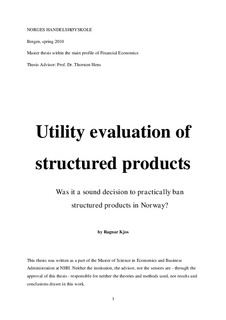| dc.contributor.author | Kjos, Ragnar | |
| dc.date.accessioned | 2010-09-15T07:03:51Z | |
| dc.date.available | 2010-09-15T07:03:51Z | |
| dc.date.issued | 2010 | |
| dc.identifier.uri | http://hdl.handle.net/11250/168531 | |
| dc.description.abstract | This master thesis in behavioral finance investigates whether it was a sound decision to
practically ban structured products from the Norwegian markets. The thesis also discusses the
relationship between culture and investment behavior.
The prospect theory analysis shows that an irrational investor can increase his utility by
investing in structured products compared to the alternative investments. Contrarily, a rational
investor will halve his utility by doing the same. The main conclusion is that investing in
structured products is irrational, and that it was a sound decision to practically ban structured
products from the Norwegian market.
An investigation of the potential link between cultural dimensions and investment choices and
behavior concludes that a Swiss investor has more than 50 percent greater utility from the
access to structured products than a Norwegian investor, which strengthens the hypothesis of
a close relationship between cultural dimensions and investment choices. | en |
| dc.language.iso | eng | en |
| dc.title | Utility evaluation of structured products: was it a sound decision to practically ban structured products in Norway? | en |
| dc.type | Master thesis | en |
| dc.subject.nsi | VDP::Samfunnsvitenskap: 200::Økonomi: 210::Bedriftsøkonomi: 213 | en |
